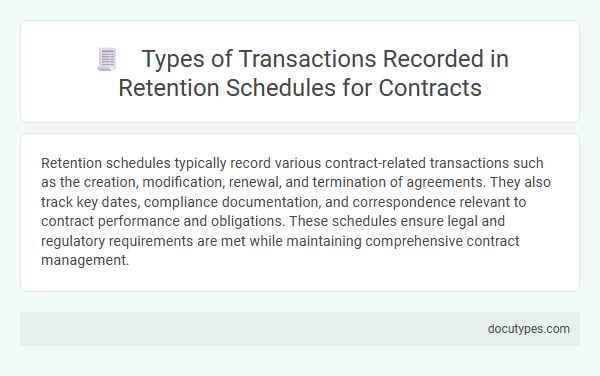Retention schedules typically record various contract-related transactions such as the creation, modification, renewal, and termination of agreements. They also track key dates, compliance documentation, and correspondence relevant to contract performance and obligations. These schedules ensure legal and regulatory requirements are met while maintaining comprehensive contract management.
Introduction to Transaction Types in Contract Retention Schedules
| Transaction Type | Description | Importance in Retention Schedule |
|---|---|---|
| Purchase Agreements | Documents detailing terms of buying goods or services. | Ensures proof of transaction and audit trail for financial and legal reviews. |
| Sales Contracts | Contracts specifying terms of selling products or services to customers. | Vital for revenue recognition and dispute resolution. |
| Leases and Rental Agreements | Agreements outlining rental terms for property or equipment. | Tracks obligations and asset management timelines. |
| Service Agreements | Contracts for providing specialized services under defined terms. | Clarifies service delivery and compliance requirements. |
| Employment Contracts | Documents that establish terms of employment for workers and contractors. | Important for HR compliance and legal protections. |
| Non-Disclosure Agreements (NDAs) | Legal contracts securing confidential information shared between parties. | Protects intellectual property and sensitive data during and after contract duration. |
| Purchase Orders | Formal offers issued to suppliers detailing quantities and prices. | Acts as a reference for order fulfillment and financial tracking. |
| Amendments and Addendums | Modifications or additions to original contracts. | Ensures all contract changes are documented for clarity and enforcement. |
Your retention schedule includes these transaction types to organize and maintain critical contract records accurately. Each type plays a key role in compliance, financial management, and legal safeguarding.
Financial Transactions Documented in Retention Schedules
What types of financial transactions are documented in retention schedules? Retention schedules record various financial transactions such as invoices, payment records, and bank statements. These documents help ensure compliance with legal and regulatory requirements.
Procurement and Purchasing Transactions
Retention schedules document essential transactions to ensure legal compliance and audit readiness. Procurement and purchasing transactions are critical components that organizations systematically record and manage for accountability.
- Purchase orders - Detailed records of goods or services requested from suppliers, including terms and quantities.
- Supplier invoices - Official billing documents received from vendors outlining amounts owed and payment terms.
- Contracts and agreements - Legal documents specifying the terms, conditions, and obligations between purchasing parties.
Accurate retention of these procurement and purchasing transactions supports financial transparency and regulatory adherence.
Contract Amendments and Modifications
Retention schedules document various transaction types to ensure proper record-keeping and regulatory compliance. Contract amendments and modifications are critical transactions that must be recorded to maintain accurate contract histories.
- Contract Amendments - Changes made to the terms or conditions of an original contract are recorded to track updates or corrections.
- Contract Modifications - Adjustments that alter the scope, pricing, or deliverables within a contract are documented to reflect agreed-upon changes.
- Approval Records - Documentation of authorizations and approvals related to contract amendments and modifications is retained as evidence of compliance.
Payment and Invoice Records
Retention schedules document various transaction types, with payment and invoice records being critical components. These records provide a detailed history of financial exchanges between parties, ensuring accountability and transparency.
Payment records include receipts, payment confirmations, and bank statements related to contract fulfillment. Invoice records capture billing details, amounts owed, and payment terms to maintain accurate financial tracking for your contracts.
Dispute Resolution and Settlement Transactions
Retention schedules record various types of transactions to ensure proper documentation and compliance. Dispute resolution and settlement transactions are critical components documented to manage legal and financial obligations efficiently.
- Dispute Resolution Agreements - Document formal agreements reached between parties to resolve conflicts outside of litigation.
- Settlement Payments - Record transactions involving monetary compensation or other considerations agreed upon to settle disputes.
- Correspondence Related to Disputes - Include communications, such as negotiation emails and letters, that support understanding and tracking dispute progress.
Termination and Expiry Transactions
Retention schedules record various types of transactions essential for contract management, including termination and expiry transactions. These transactions mark the formal conclusion or end date of contractual agreements, ensuring proper documentation and compliance.
Termination transactions capture the early or mutual ending of contracts before the agreed expiry date. Expiry transactions document the natural conclusion of contracts upon reaching their predefined end date. Recording these transactions enables organizations to manage obligations, audit trails, and legal requirements effectively.
Compliance and Regulatory Reporting Transactions
Retention schedules document various types of transactions, emphasizing Compliance and Regulatory Reporting Transactions to ensure adherence to legal requirements. These transactions include records related to audits, financial disclosures, and regulatory filings.
Maintaining accurate retention schedules for Compliance and Regulatory Reporting Transactions supports organizations in meeting government mandates and avoiding penalties. These records facilitate transparency and accountability throughout the contract lifecycle.
Subcontracting and Assignment Records
Retention schedules document various transaction types to ensure legal compliance and efficient record management. Subcontracting records capture detailed agreements and work orders between primary contractors and subcontractors. Assignment records track the transfer of contractual rights or obligations from one party to another, maintaining transparency and accountability throughout the contract lifecycle.
What Types of Transactions Are Recorded in Retention Schedules? Infographic

